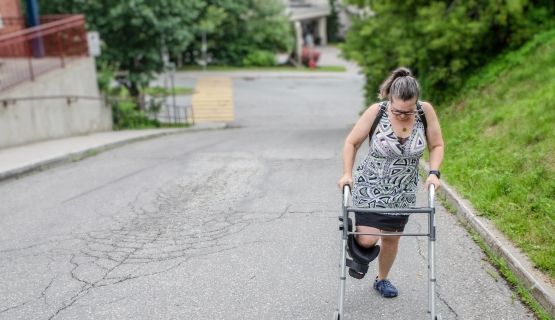Return to work, accommodation and support
IWH has a long history of conducting research on practices, policies and processes that help workers sustainably return to work after an illness or an injury. This page pulls together IWH research and resources on employer supports, job accommodations and modifications, as well as other related issues such as disclosure of disability.
Featured

At Work article
Injured workers face mental health challenges beyond diagnosable conditions
Workers with a work-related physical injury that takes them off the job can have a wide range of mental health experiences, beyond diagnosable conditions. That’s according to an IWH study which also found that differences in injured workers’ mental health were linked to return-to-work outcomes.
Published: April 9, 2025

Research Highlights
Examining four types of job disruptions due to a health condition, and the differences expected when workplace support needs are met
Job disruptions are common among workers living with chronic physical and/or mental health conditions, an IWH study has found. The study investigated the effects of workplace supports had on four types of job disruptions.
Published: March 11, 2025

IWH in the media
Chronic diseases not slowing down older workers
Personal health may be a factor for older workers in deciding when to retire, but it’s not as big a factor as previously thought, according to a new Institute for Work & Health study. Despite experiencing more pain and fatigue, older workers with arthritis, diabetes or both were no different from their healthy peers in their retirement plans, writes John Dujay.
Published: Canadian HR Reporter, August 2019

Research Highlights
Comparing the retirement expectations of older workers with and without chronic conditions
Workers with arthritis and diabetes, despite their health difficulties, have similar retirement plans as their healthy peers. Yet workers with chronic conditions are more likely than their healthy peers to report having retired previously and returned to work, often in part-time positions.
Published: August 2019

At Work article
Psychosocial work conditions linked with both positive and negative mental health
Greater job control, job security and social support at work not only lower the risks of mental disorders; they may also raise the likelihood of flourishing mental well-being.
Published: July 2019

At Work article
Despite pain and fatigue, older workers with chronic conditions want to work to age 65
Having a health condition or a chronic disease can be challenging for older workers, but it doesn't necessarily decrease their desire to work and retire at about the same age as healthy peers, finds an IWH study of retirement expectations.
Published: July 2019

Research Highlights
Psychosocial work conditions and mental health
Having positive mental health is not the same as having no mental illness. The two are related, but distinct, concepts. A study by IWH suggests that better psychosocial work conditions—greater job security, job control and social support—can have greater influence on one more than the other.
Published: June 2019

Research Highlights
Gender differences in the impact of eldercare on work
Women are much more likely than men to stop working, to work part time and to temporarily take time off work in order to care for an older relative. These differences are seen even after taking into account factors such as marital status, having children, hours of work, pay level, job tenure, and status as main wage earner in the household.
Published: June 2019

Tools and guides
Supporting return to work among employees with musculoskeletal or mental health conditions: an evidence-based practical resource
This resource synthesizes the research evidence on the practical solutions that workplaces can implement (in conjunction with workers' compensation, insurance and health-care authorities) to support the return to work of employees with musculoskeletal disorders or mental health conditions.
Published: May 2019
Project
Project
Return to work in policing: synthesizing current practices and implementation guidance
An IWH research team is exploring return to work in policing, by combining the best available research evidence on what works with the practices currently being used by Ontario police services that they identify as effective. The project is expected to culminate in a guide to support the implementation of RTW programs in Ontario police services.
Status: Completed

At Work article
Women’s work more likely than men’s to be disrupted due to caring for older relatives
Women are 73 per cent more likely than men to permanently leave a job due to eldercare responsibilities. They're also five times more likely to work part time to care for their older relatives, a new IWH study has found.
Published: April 2019
Journal article
Journal article
Work disability management communication bottlenecks within large and complex public service organizations: a sociotechnical systems study
Published: Journal of Occupational Rehabilitation, April 2019